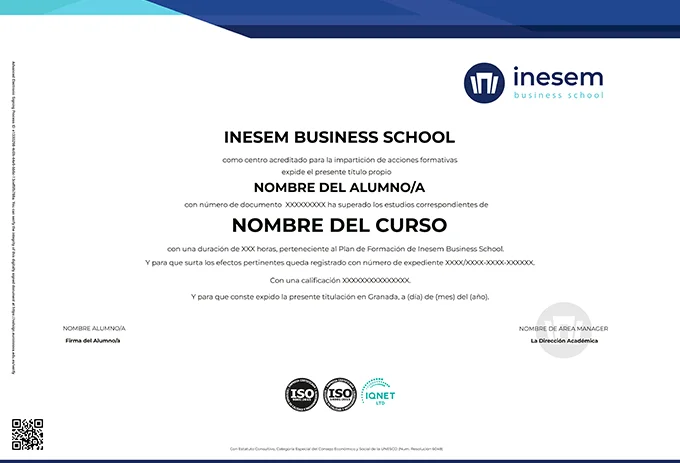- Presentación
- Temario
- Metodología
- Titulación
Descripción
¿A quién va dirigido?
Objetivos
Salidas Profesionales
Temario
UNIT 1. MACHINE LEARNING
- Machine Learning
- Types of machine learning
- - Supervised
- - Unsupervised
- - Reinforced
- Machine learning algorithms and models
- Evaluation metrics in machine learning
- Regularization and feature selection in machine learning
UNIT 2. ARTIFICIAL NEURAL NETWORKS (ANN)
- Artificial Neural Networks (ANN)
- Structure and architecture
- Activation functions
- Training of the ANNs
- Convolutional Neural Networks (CNN) and their application
- Recurrent Neural Networks (RNN) and their application
- Generative Adversarial Models (GAN) and their application
UNIT 3. NATURAL LANGUAGE PROCESSING (NLP)
- Fundamentals of Natural Language Processing (NLP)
- Language representation in NLP
- - Bag of words
- - Language models
- Feature extraction in NLP
- Sequence-based NLP models
- - LSTM
- - GRU
- - Transformer
- NLP models for specific tasks
- - Text classification
- - Text generation
- - Machine translation
- Applications of NLP
- - Chatbots
- - Sentiment analysis
- - Text summarization
UNIT 4. COMPUTER VISION
- Computer vision
- Image preprocessing and transformation
- - Filters
- - Geometric transformations
- Object detection and recognition
- - Edge detection
- - Feature descriptors
- - Object classifiers
- Image segmentation and classification
- - Semantic segmentation
- - Region-based segmentation
- - Image classification with CNN
- Application of computer vision
- - Facial recognition
- - Autonomous driving
- - Augmented reality
UNIT 5. BIG DATA PROCESSING IN ARTIFICIAL INTELLIGENCE
- Big data in artificial intelligence
- Distributed storage and processing
- - Distributed file systems
- - Hadoop
- - Spark
- Technologies and tools for big data processing
- - MapReduce
- - Pig
- - Hive
- Knowledge extraction from big data
- - Data mining
- - Graph analysis
- Machine learning in big data
- - Distributed learning
- - Mini-batch
- - Stochastic Gradient Descent (SGD)
UNIT 6. OPTIMIZATION AND FINE-TUNING OF AI MODELS
- Model evaluation and performance metrics
- Hyperparameter optimization
- - Grid search
- - Random search
- - Bayesian optimization
- Regularization and overfitting prevention techniques
- Dimensionality reduction techniques
- - Principal Component Analysis (PCA)
- - Feature Selection
- Model tuning and ensemble methods
UNIT 7. REINFORCEMENT LEARNING
- Reinforcement learning
- Agents and environments in reinforcement learning
- Reinforcement learning methods
- - Q-Learning
- - SARSA
- - Actor-Critic
- Exploration and exploitation in reinforcement learning
- Applications of reinforcement learning
- - Games
- - Robotics
UNIT 8. DEPLOYMENT AND PRODUCTION OF AI MODELS
- Data preparation for model deployment
- Design and implementation of AI services
- Monitoring and evaluation of models in production
- Updating and maintenance of AI models
- Scalability and performance in AI model deployment
Metodología
EDUCA LXP se basa en 6 pilares
Titulación

INESEM Business School se ocupa también de la gestión de la Apostilla de la Haya, previa demanda del estudiante. Este sello garantiza la autenticidad de la firma del título en los 113 países suscritos al Convenio de la Haya sin necesidad de otra autenticación. El coste de esta gestión es de 65 euros. Si deseas más información contacta con nosotros en el 958 050 205 y resolveremos todas tus dudas.
Explora nuestras Áreas Formativas
Construye tu carrera profesional
Descubre nuestro amplio Catálogo Formativo, incluye programas de Cursos Superior, Expertos, Master Profesionales y Master Universitarios en las diferentes Áreas Formativas para impulsar tu carrera profesional.
Course on Techniques and Applications of Artificial Intelligence
